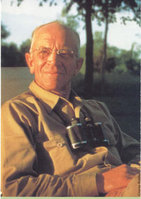 Julianne Lutz (Newton) Warren, an '88 alumna, will join Carl Leopold from Cornell University, son of the late Aldo Leopold, to present "Aldo Leopold's Odyssey: An Assessment of the Emergence of the Aldo Leopold Conservation Vision". This Sustainability Cafe will be held in the McDonald Lounge in the Campus Center from 12:00-12:50 on Thursday, April 5th.
Julianne Lutz (Newton) Warren, an '88 alumna, will join Carl Leopold from Cornell University, son of the late Aldo Leopold, to present "Aldo Leopold's Odyssey: An Assessment of the Emergence of the Aldo Leopold Conservation Vision". This Sustainability Cafe will be held in the McDonald Lounge in the Campus Center from 12:00-12:50 on Thursday, April 5th.
Considered by many as the father of wildlife management and of the United States’ wilderness system, Aldo Leopold was a conservationist, forester, philosopher, educator, writer, and outdoor enthusiast. Leopold developed an interest in the natural world at an early age, spending hours observing, journaling, and sketching his surroundings. Throughout Leopold’s career in the U.S. Forest Service, he continued his investigations into ecology and the philosophy of conservation, and in 1933, he published the first textbook in the field of wildlife management. Later that year, he accepted a new chair in game management at the University of Wisconsin, and he and his family initiated their own ecological restoration experiment on a wornout farm along the Wisconsin River outside of Baraboo, Wisconsin. Planting thousands of pine trees, restoring prairies, and documenting the ensuing changes in the flora and fauna further informed and inspired Leopold.
A prolific writer, authoring articles for professional journals and popular magazines, Leopold conceived of a book geared for general audiences examining humanity’s relationship to the natural world. Unfortunately, Leopold died unexpectedly just one week after receiving word that his manuscript would be published. A little more than a year after his death, Leopold’s collection of essays A Sand County Almanac was published. With over two million copies sold, it is one of the most respected books about the environment ever published, and Leopold has come to be regarded by many as the most influential conservation thinker of the twentieth century. Leopold’s legacy continues to inform and inspire us to see the natural world “as a community to which we belong.” (adapted from The Aldo Leopold Foundation).
This Sustainability Cafe is co-sponsored by the department of Biology. Dr. John Confer will introduce the speakers. The Spring 2007 Sustainability Cafe series is sponsored in part by the Sustainability in the Community program, with support from the Ithaca Fund administered by the Office of the Dean of the School of Humanities and Sciences.
Julianne Warren will also meet with Environmental Studies students at 5pm in the Center for Natural Sciences, an event that is also open to the public.